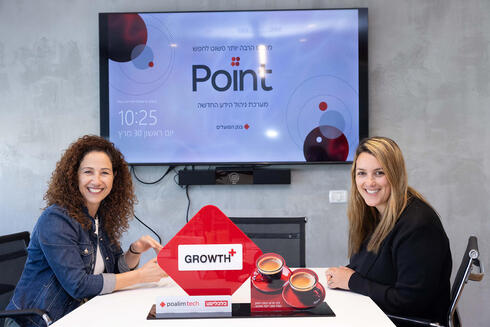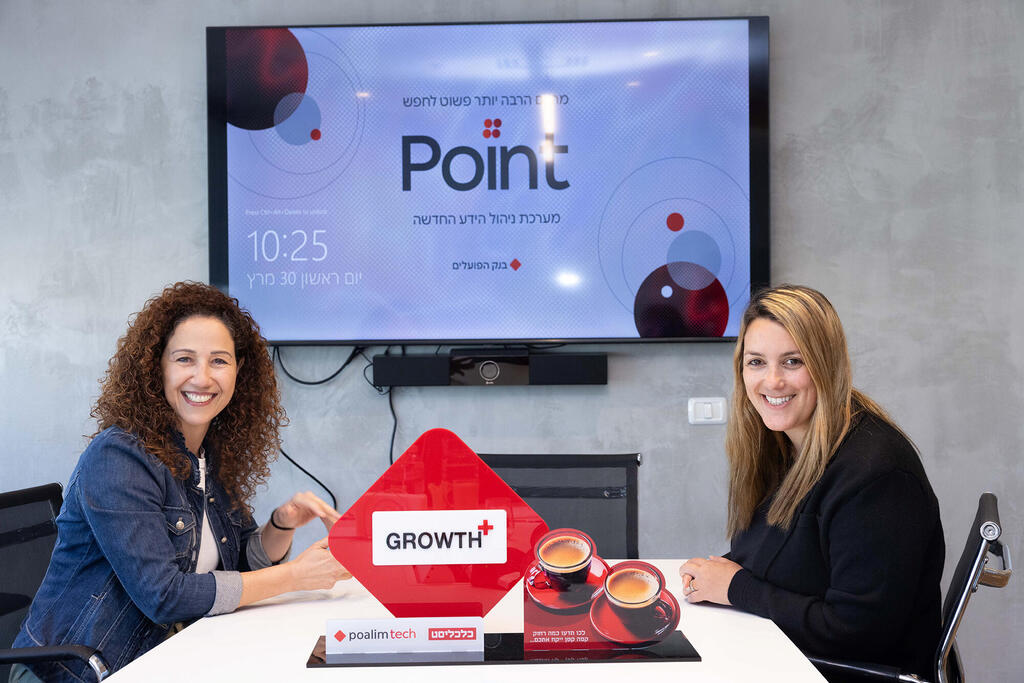
"You must go to market as quickly as possible. Don’t waste time"
As part of the Growth+ project by Calcalist and Poalim Tech, seasoned entrepreneurs like Hani Goldstein, founder of gift platform Snappy, are meeting with early-stage founders such as Eti Neaman of Neao to share hard-earned lessons about building, growing, and surviving in today’s volatile tech landscape.
In an era when Israeli startups face mounting economic and geopolitical challenges, the Growth+ project by Calcalist and Poalim Tech is fostering resilience through mentorship. As part of the initiative, seasoned entrepreneurs like Hani Goldstein, founder of gift platform Snappy, are meeting with early-stage founders such as Eti Neaman of Neao to share hard-earned lessons about building, growing, and surviving in today’s volatile tech landscape.
Growth+ facilitates one-on-one meetings between experienced entrepreneurs and early-stage startups to offer advice, support, and knowledge about entrepreneurship, startup management, and building companies for growth.
Hani, what was the biggest crisis at the beginning of your journey, and what did you learn from it?
"There are endless crises, but if I had to choose one—it would be at the beginning, when my partner and I spent a year and a half developing an app. We built something amazing that would help people send gifts with the click of a button. The party receiving the gift was supposed to have a magical and special experience. Then we launched the app—and nothing happened. There were no millions of users, surprisingly. At that moment, we explored all sorts of directions for a public launch, and luckily for us, right after the launch, an article appeared in TechCrunch, and suddenly we started receiving inquiries from companies. Not from private consumers, but from organizations with thousands of employees who wanted to send gifts through us to employees and customers. It was a breakthrough we didn’t expect. We were trying to build a product for consumers, and the real customers were businesses. It helped us grow and that was the turning point."
What did you learn from this that is important for entrepreneurs to know?
"I think Eti specifically doesn’t need this advice because she did the exact opposite, but in general, you must go to market as quickly as possible. Don’t waste time developing things you haven’t tested yet."
Eti, what was your biggest difficulty this year?
"Two main challenges: raising money—especially in the worlds we operate in, mental health and impact, which are areas not yet fully recognized in the capital markets and by venture capital funds—and entering healthcare organizations, which are much slower to adopt new technologies due to regulation and cumbersome processes."
Hani, what advice would you give Eti in dealing with this difficulty?
"In my opinion, Eti’s next step is to find a technology partner. Once that happens, she’ll be able to move forward without anything stopping her."
What did you learn from each other?
Eti: "There’s nothing like learning from someone with experience. Hani has four fundraising rounds behind her, she’s already operating in the U.S., and that’s exactly where I want to be. She knows how to sit in front of investors and understands how they view entrepreneurs. She has a lot of knowledge and experience that can really, really contribute."
Hani: "I was fascinated by the way Eti started—her initiative grew out of her volunteering during the war, when she tried to help various affected groups. It's amazing to see something so meaningful grow from such a place."
Michal Kissos Hertzog, CEO of Poalim Tech, which initiated the Growth+ project, said:"In 2025, entrepreneurs once again find themselves facing a complex reality: on the one hand, rapid technological progress, especially in the field of artificial intelligence, and on the other, geopolitical and economic challenges. The security situation in Israel continues to affect the local economy, and uncertainty increases the pressure on entrepreneurs, who must navigate their businesses through constantly changing conditions. The challenge is not just to survive, but to grow and innovate. In the midst of all this, it’s crucial to remember the value of personal balance. The ability to take breaks, spend time with family and friends, and maintain mental and physical health is not a luxury—it is a condition for long-term success. Entrepreneurs who manage to combine intensive work with a balanced life are the ones who can lead their companies forward, even in difficult times."
Through the Growth+ project, Calcalist and Poalim Tech continue to connect entrepreneurs with experienced mentors, providing tools and support for the challenging journey of building successful companies in today’s environment.














